Are gluten-free diets a performance booster, or just an expensive fad?
Some are allergic to gluten, others avoid it by choice. Either way, gluten-free diets are increasingly popular among cyclists. But are they worth it? Rob Kemp investigates
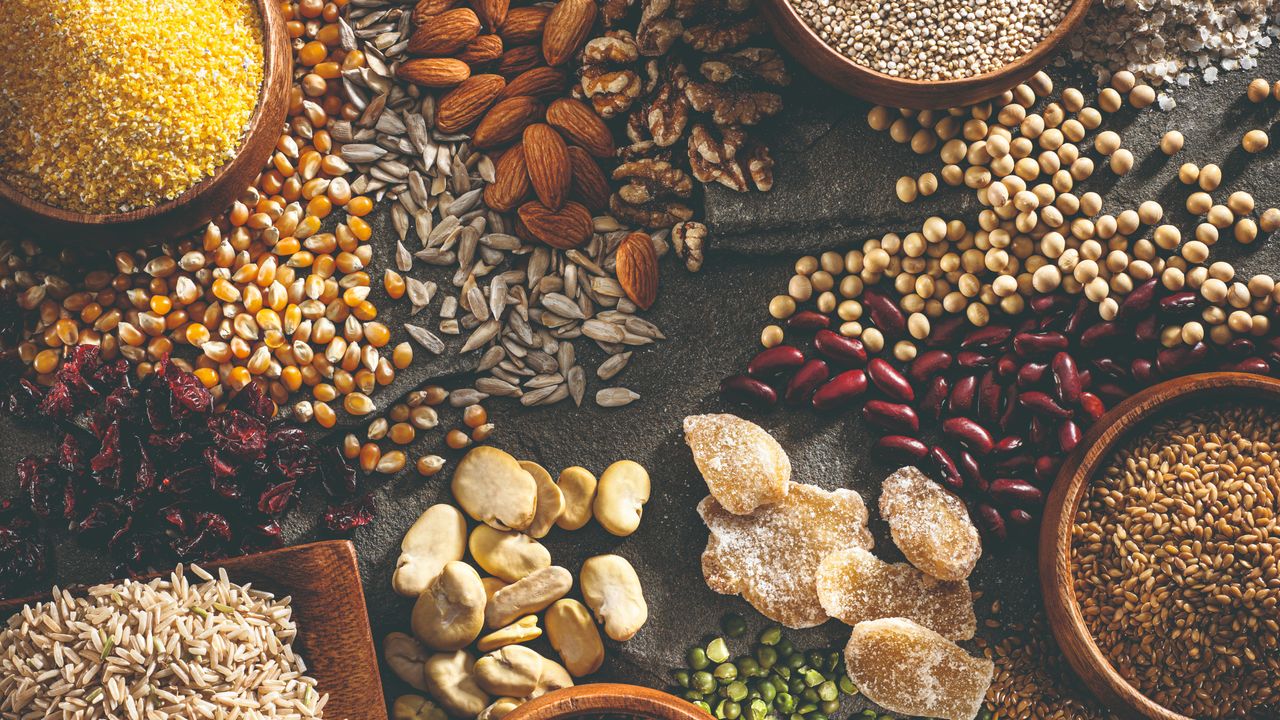

Going gluten-free (GF) has become a popular dietary move among cyclists of all levels. For some, suffering from an allergy or intolerance to gluten, it’s a necessity that comes with well documented and far-reaching benefits. For others, despite not being diagnosed as allergic to gluten, going gluten-free is the latest tantalising promise of a relatively simple marginal gain – one that they claim balances their digestive system, improves athletic performance and speeds up post-exercise recovery.
The most notable converts in the world of sport include world number-one tennis player Novak Djokovic. “It wasn’t a new racquet, a new workout, a new coach, or even a new serve that helped me lose weight, regain mental focus, and be the healthiest I’ve ever been – it was a new diet,” writes Djokovic in his book, Serve to Win: The 14-Day Gluten-Free Plan for Physical and Mental Excellence.
In the world of elite cycling, some riders have been cutting out gluten for years. As far back as 2008, the Garmin Transitions Pro Cycling team switched to GF carb sources under the guidance of exercise physiologist and rice-cake guru Dr Allen Lim. By 2015 Nigel Mitchell, the chief nutritionist at British Cycling, was incorporating a gluten-free range into the team’s recipe repertoire. In one 2016 survey, 56% of athletes believed a GF diet improved their performance.
The rising number of sportsmen and women signing up to go GF was coupled with a surge in the supply of gluten-free foods. In the US, a study reported in the journal Gastroenterology & hepatology found that more than $15bn was spent on retail sales of GF foods annually, double the amount spent in 2011. Today pro riders and teams – including Patrick Konrad at Lidl-Trek and Giovanni Aleotti at Bora-Hansgrohe – adapt their meal plans and in-saddle snacks to cut out gluten-filled foods. But what’s so harmful about gluten in the first place?
Digestion disruptor
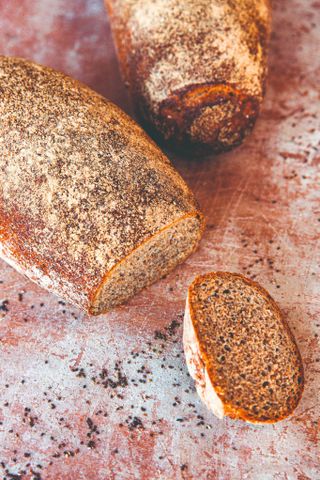
Gluten is commonly part of the make-up of bread, and a wide range of other carbs
Gluten is a naturally occurring protein found in wheat, rye, barley, starches, spelt and semolina. It’s commonly part of the make-up of bread, pasta, pizza dough, crackers, cakes, pancakes, waffles and cereals. Basically, if you like your carbs baked – as so many of us cyclists do – then gluten is on your menu. “While oats do not contain gluten, oat flakes are often produced in places that also produce wheat flakes, so they may contain trails of gluten too,” says Robert Gorgos, head nutritionist with Germany’s Bora-Hansgrohe cycling team.
Gluten itself is a combination of glutelin and prolamin protein molecules found in wheat, barley and rye. It’s decried by some as having little nutritional value, but it is a good flavour carrier often used as an additive in ready meals. As a binding agent, it is fundamental in the baking of bread.
For some people, gluten triggers diarrhoea, abdominal pain, bloating and fatigue, and therefore a GF diet is essential for a calmer digestive system. Those with coeliac disease, an acute allergy to gluten, are unable to eat the substance without it causing severe stomach inflammation. Hence they need to find alternative food sources, which have become more widely available over the past 15 years.
Get The Leadout Newsletter
The latest race content, interviews, features, reviews and expert buying guides, direct to your inbox!
Is gluten the enemy?
“While only a very small percentage of the population are coeliacs [about 1% in the UK], that doesn’t necessarily mean that the other 99% can eat all the gluten they want with no symptoms at all,” explains Matt Lovell, Team GB nutritionist, founder of aminoman.com. “Up to 14% have a diagnosable intolerance, according to research from Poland’s Medical University of Lublin, but I’d estimate that as many as one in four have some form of intolerance, based on observable symptoms,” says Lovell. Dr Rodney Ford, a food allergy expert in Christchurch, New Zealand and author of The Gluten Syndrome, says the percentage of people per head of population who are gluten-sensitive could be anything between 30% and 50%. In the UK, the Association of UK Dieticians estimate that around 13% of the population may have gut issues triggered by gluten. However, this is based on 10-year-old research. Gluten-sensitivity certainly seems to be on the rise. “A gluten intolerance is more of a low-grade reaction to the gluten protein,” explains Lovell. “In susceptible individuals, it could develop into coeliac disease if they carry those genes. In everyone else, the general downside to an excess of gluten is stomach discomfort, fatigue and a degree of inflammation.”
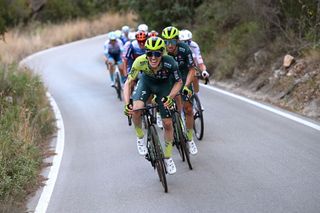
Bora’s Aleotti offers up a wheat-free wheel
Cyclists who suffer from a non-coeliac gluten sensitivity report headaches, bloating, fatigue and diarrhoea. “I would get stomach problems – a lot of discomfort that was really difficult to deal with during the training,” explains Giovanni Aleotti, a 22-year-old pro cyclist with team Bora-Hansgrohe, diagnosed as gluten intolerant. Aleotti has twice won the Romanian Sibiu Cycling Tour and is a rising talent in stage racing. “Switching to a gluten-free diet made me feel normal again, without any issues,” he says. Aleotti uses GF energy bars and recovery meals via the team’s supplier Mnstry (mnstry.com/en). Another WorldTour rider who has had to switch to a GF diet is Lidl-Trek’s Patrick Konrad (see box).
Matt Lovell is keen to point out that the body’s reaction to gluten can vary from one cyclist to the next, but in more severe cases inflammation can affect a rider’s performance. “Leaky gut – symptoms including bloating, gas, cramps, food sensitivities, and aches and pains – can happen to anyone whether they are coeliac or not. But coeliacs can’t tolerate any gluten, as it increases malabsorption and gut inflammation.”
In coeliac disease, gluten triggers a harmful immune response. “The make-up of gluten is similar to molecules found in joint structures, triggering an effect known as molecular mimicry,” says Lovell. The immune system mistakes substances found inside gluten as a threat to the body. “Your immune system attacks the gluten proteins but then also attacks itself.”
Carb conversions
“Fortunately, it’s quite easy to go gluten-free these days,” says Lovell. “Everything from penne pasta to bread is available GF. They’re usually made from corn and rice – the bread holds together quite nicely now, whereas the early versions were quite fragile and fell apart easily.” Lovell is a big fan of Marks & Spencer GF bloomer loaves. “Cyclists with a gluten intolerance can get a decent amount of carbs from rice and root vegetables – especially sweet potatoes.”
Lovell is keen to point out that while coeliacs suffer severe side-effects when exposed to gluten, those who have an intolerance need to strike the right balance between avoiding gluten and getting enough carbs. He cites the example of a female rugby player he worked with who suffered a gluten intolerance. “Before a game, the only food on offer was gluten-containing sandwiches, which she chose to avoid. But that meant she was under-fuelled for the match. The bottom line is that when you’re performing in any sport – especially cycling – you need ample stores of glycogen. Without glycogen, you can’t produce power.”
There is a case, then, for sometimes grinning and bearing mild symptoms. “If you’re gluten intolerant, it may be preferable to manage some bloating in the heat of competition instead of sacrificing your fuel supply completely,” says Lovell. “Your adrenalin will kick in and override much of the discomfort. It’s not ideal, I know, and in that situation the rugby player should have just had a hot coffee with a lot of sugar thrown in, but you have to think of the bottom line. Without fuelling of any kind – even gluten - you can’t beat the opposition.”
Non-coeliacs ditching gluten
More recently nutrition scientists have been taking a closer look at the purported benefits of going GF for non-coeliacs or those seemingly unaffected by gluten. In a 2018 study into the effects of a short-term GF diet among non-coeliac competitive cyclists – with no history of irritable bowel symptoms – University of Colorado researchers found no difference between the GF and non-GF diets on any marker of performance, digestive health or inflammation.
Even as far back as 2015, a small-scale study had one group of riders consume 16g of wheat gluten daily while another group others followed a GF diet. Researchers from the University of Tasmania and the Canadian Sport Institute Pacific tracked 13 non-coeliac competitive cyclists as they followed a gluten-free diet for one week and then, after a ‘washout break’, added some gluten for a week. The results showed no statistically significant differences in athletic performance, perceived GI distress, inflammatory markers, intestinal damage or overall wellbeing between the GF and gluten-containing periods.
Meanwhile, in an Australian survey of athletes, a sizeable proportion of the respondents said that they avoided foods containing gluten because they thought that they were allergic or overly sensitive to it – even though only 13% had received a formal medical diagnosis of coeliac disease or other gluten-related disorders.
Claims of weight loss while following a GF diet are also common – but sceptical scientists are keen to point out that this can as easily be a side-effect of reducing the intake of calorie-dense foods such as cakes and biscuits. Indeed, some nutritionists argue that the real boost cyclists get from following a GF diet is that they simply become more aware of what they’re eating. Trying to cut out gluten involves varying our food choices – and consuming more fruit and veg – with the well-established knock-on effects that come with having a less calorific, more nutritious diet
Gluten Morgen
How to make gluten-free pancakes
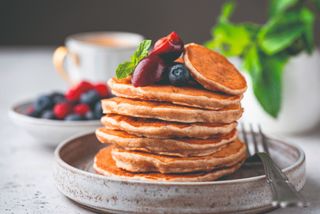
Hannah Grant, cycling and author of The New Grand Tour Cookbook, works with pro teams to creates GF recipes for riders.
You will need: 3 eggs, 250ml plant/regular milk, 3tbsp maple syrup, ½ tsp xanthan gum or psyllium husks, 50g rice flour, 50g oat flour, 1 tsp fine salt, 50g regular or vegan butter plus extra for frying.
Whisk eggs, milk and maple syrup together, stir in xanthan gum or husks and let sit for 2-3min. Mix rice and oat flour in a bowl with salt, and melt butter on a low heat. Sift flour mixture into egg mixture and beat into a batter. Whisk in the melted butter and let rest for 5min before frying. Heat a small pan over a med?high heat and grease with a small lump of butter. Pour approx. 50ml of batter on the pan. Use a small spatula to spread the butter carefully. Fry the pancake on both sides until golden brown. Serve topped with fruit salad, skyr or yoghurt and maple syrup
Within the cycling community, there are now a number of experts who challenge the assumption that riders who don’t have a demonstrable sensitivity to gluten benefit from some kind of performance boost by going gluten-free. Robert Gorgos, the Bora-Hansgrohe nutritionist, is one such sceptic. While he provides support for riders diagnosed gluten intolerant – such as Giovanni Aleotti – Gorgos is insistent that there’s little or nothing to be gained from shunning gluten if you don’t have coeliac disease. “I always argue with scientific evidence, and from my point of view, gluten cannot have a negative effect on the performance of a non-coeliac patient,” says Gorgos. “So, if someone does not have coeliac disease, i.e. already reacts to traces of gluten with problems, I see no reason to omit gluten.”
Even so, Gorgos is alert to the possible knock-on effects of riders being more discerning in their food choices. “The person who makes the dietary change focuses more on their intake, cares about food and therefore often improves its quality almost automatically,” he says. “Actually, this is the main effect of a diet or change of diet – and it could be similar among those who exclude gluten.” In other words, there could be unintentional dietary improvements. “Gluten is in a lot of wheat products,” continues Gorgos, “many of which have poor nutrient density, especially white bread, and baked goods. I imagine that everyone would benefit from replacing such products with healthier alternatives – but it’s not principally about the gluten itself.”
Indeed, a 2021 report published in the journal Frontiers of Nutrition suggests that cyclists may be too quick to blame their digestive woes on gluten. Instead, a group of carbs called Fodmaps (fermentable oligosaccharides, disaccharides, monosaccharides and polyols) may be to blame for excessive gas, bloating and stomach pain. Fodmaps are short-chain sugars found in certain fruits, vegetables and dairy products, and they can be hard for the gut to absorb.
A 2022 study published in the Journal of the International Society of Sports Nutrition showed that cutting out specific Fodmap-containing foods for a week alleviated exercise?related gastrointestinal issues including cramps and bloating in 69% of people who experienced these issues, and also improved subjects’ perceived ability to exercise. Further investigation into the impact of Fodmaps is required, and for now many cyclists continue to adopt a GF diet in the belief that it is not only healthier but that it will also decrease gastrointestinal distress and systemic inflammation.
As the GF trend has grown among riders, so the producers of performance snacks and supplements have got in on act. From energy bars to plant-based protein shakes, there’s a gluten-free option in almost everything. But the jury remains out as to whether those who aren’t suffering with the side-effects of a gluten intolerance are really getting a gluten-free benefit
Pro rider view: I'm a wheat free winner
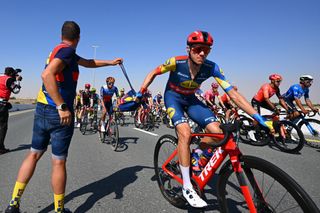
Patrick Konrad was diagnosed with coeliac disease when he became a pro cyclist
Since going gluten-free, 32-year-old pro rider Patrick Konrad (Lidl-Trek) has twice achieved a top-10 finish in the overall standings at the Giro d’Italia. The Austrian also won stage 16 at the Tour de France 2021.
“Since I was a child, I had stomach issues from time to time and often felt unwell. When I became a pro cyclist [in 2014] I was diagnosed with coeliac disease. The good thing is that I don’t need any medication – but I have to follow a strict gluten?free diet. At the beginning, it was tough, as I got used to avoiding cross contamination. Gluten appears in many more foods than you may think.
“If ever I’m caught out by something contaminated, I feel really unwell and sick. It’s also really bad for my small intestine and could have long-term effects including inflammation that’ll affect my general health and cycling performance.
“Since going gluten-free, I’ve had much more energy, my stomach issues disappeared and I have a much better nutrient intake, which is, in fact, the main point when you suffer from a coeliac disease. It’s more a long-term improvement, not something you immediately recognise.
“There are a lot of gluten-free products on the market now, compared to 10 years ago. Our team-sponsor Enervit uses gluten?free oats in all their products and produces everything gluten-free. This makes my life during the races much easier, as I don’t have to think or worry about it. Before or after the races, I’m supported with gluten-free breads and cereals via Lidl too.”

Thank you for reading 20 articles this month* Join now for unlimited access
Enjoy your first month for just £1 / $1 / €1
*Read 5 free articles per month without a subscription

Join now for unlimited access
Try first month for just £1 / $1 / €1

Rob Kemp is a London-based freelance journalist with 30 years of experience covering health and fitness, nutrition and sports sciences for a range of cycling, running, football and fitness publications and websites. His work also appears in the national press and he's the author of six non-fiction books. His favourite cycling routes include anything along the Dorset coast, Wye Valley or the Thames, with a pub at the finish.
-
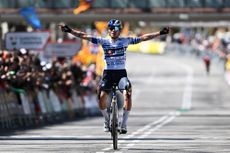 Can anyone stop Primož Roglič or Juan Ayuso from winning the Giro d’Italia?
Can anyone stop Primož Roglič or Juan Ayuso from winning the Giro d’Italia?Roglič and Ayuso's form suggest they are the two outright favourites for overall victory in Rome next month
By Tom Thewlis Published
-
 How to watch Dwars door Vlaanderen 2025: Everything you need to live stream the cobbled Belgian Classic
How to watch Dwars door Vlaanderen 2025: Everything you need to live stream the cobbled Belgian ClassicAll the information on broadcasters and live streams for Dwars door Vlaanderen on 2 April, as Wout van Aert, Mads Pedersen, Marianne Vos and Lotte Kopecky take on the cobbles.
By Tom Davidson Published